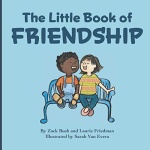|
Quote of the Week
"A friend is one of the nicest things you can have and one of the best things you can be." -- Winnie the Pooh

Evidence-based Ways Parents Can Help Kids To Make Friends
 As a new school year begins, many parents are thinking about how their children will transition back, especially when it comes to social situations and friends. We all want our kids to feel like they belong at school, to have close friends they trust and to feel supported and at ease socially and emotionally. While parents aren't present at school, evidence shows that there is a lot for us to think about and do to support our kids in making friends and feeling more comfortable and confident in their social interactions.
As a new school year begins, many parents are thinking about how their children will transition back, especially when it comes to social situations and friends. We all want our kids to feel like they belong at school, to have close friends they trust and to feel supported and at ease socially and emotionally. While parents aren't present at school, evidence shows that there is a lot for us to think about and do to support our kids in making friends and feeling more comfortable and confident in their social interactions.
This week our two featured articles from Harvard Health and Parenting Science share helpful, evidence-backed ways parents can support children to make friendships, including many tips which begin with how we interact with our children at home.

Reading Corner
 Title: The Little Book Of Friendship: The Best Way to Make a Friend Is to Be a Friend
Title: The Little Book Of Friendship: The Best Way to Make a Friend Is to Be a Friend
By: Laurie Friedman
Ages: 3-8
"The Little Book of Friendship was such a cute and sentimental read. Although this book was written for children who need to learn how to make friends and how to be a good friend, you could very well give any age child including college-aged kids, haha. In the past, children made friends almost naturally. Now with the distractions of video games and tablets, children are so distracted and seem to have less social skills. I loved this book from beginning to end. The illustrations were so cute. The helpful captions and arrows made the story so much easier to follow. My favorite parts were discussing conflict, highlighting diversity, embracing difference, and being inclusive. Great job to the author and illustrator. I definitely recommend to parents of children age birth to 8." -- "Happy Mom" (Amazon Reviewer)
Recommended by Kindful Kids Editors

Be The Change
Find ways to engage with your children while helping them to develop their social skills. For example, come up with a cooperative household task or project that you can do together as a family. It can be as simple as cleaning up together after a meal or more involved like a mini gardening or building project. Use this opportunity to communicate with your child in a way that invites dynamic conversation and even discusses differences opinion, as this will organically support the development of social skills in the process.

Kindful Kids newsletter is a resource for parents who are keen to teach children about compassion and service. It reaches 3,917 subscribers. You can unsubscribe here.
|